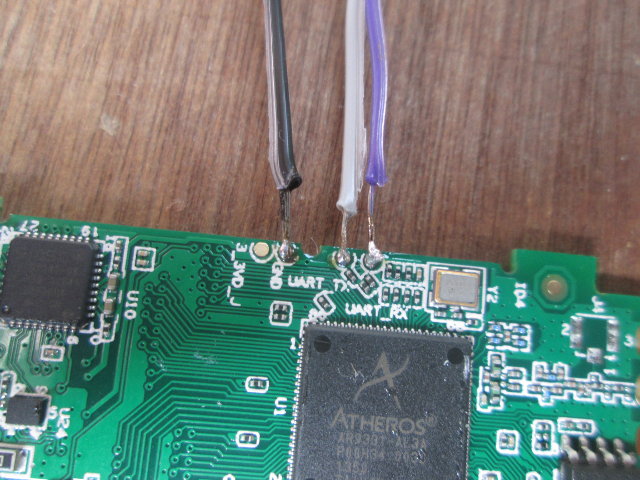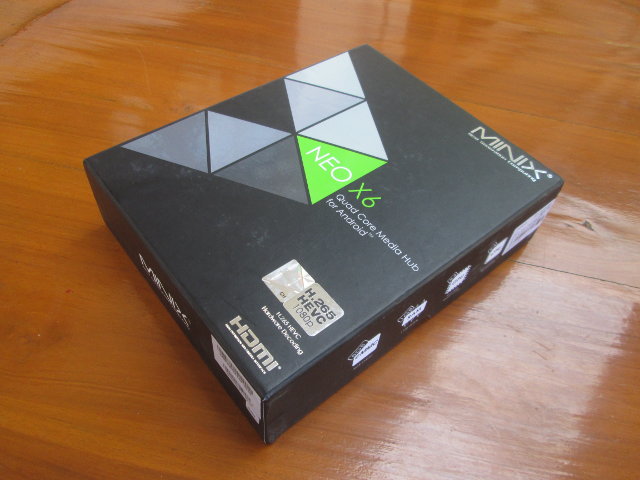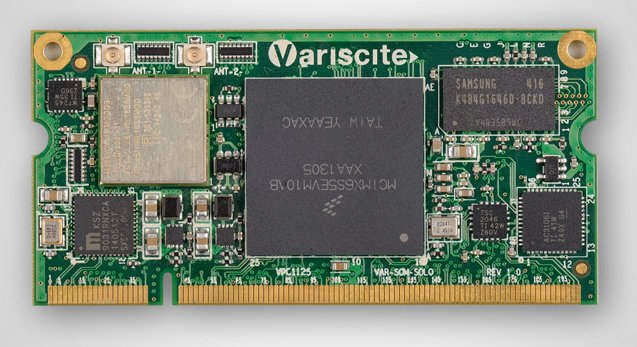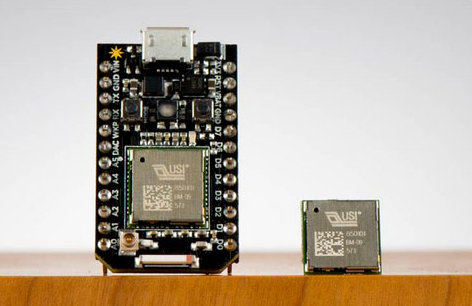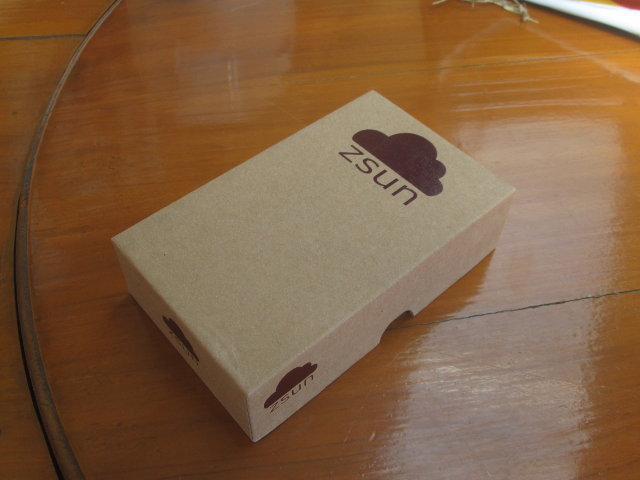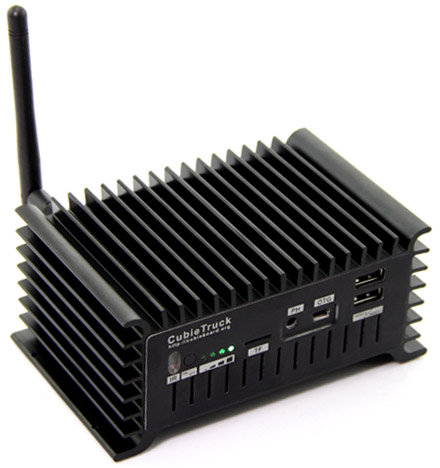Zsun SD11x are Wi-Fi flash drives for 8 to 128 GB eMMC, alternative to Sandisk or Kingston. Yesterday, I soldered the UART pins to Zsun SD111 (8GB) flash drive to access the serial console, but I did not manage to enter the terminal as it was password-protected. I posted my results anyway, as I was convinced I would get some clever ideas from my readers, some of which appeared to be a little time consuming, but Zoobab offered a simple solution that consisted in changing the boot parameters, by replacing /sbin/init by /bin/sh. The first step is to interrupt the boot by pressing space or another key, in order to access U-boot. Now we can check the U-boot environment ar7240> printenv bootargs=console=ttyS0,115200 root=31:02 rootfstype=jffs2 rw init=/sbin/init mtdparts=ar7240-nor0:64k(u-boot),64k(u-boot-env),6720k(rootfs),1216k(uImage),64k(NVRAM),64k(ART) bootcmd=bootm 0x9f6B0000 bootdelay=4 baudrate=115200 ethaddr=0x00:0xaa:0xbb:0xcc:0xdd:0xee ipaddr=10.168.168.1 serverip=10.168.168.10 stdin=serial stdout=serial stderr=serial ethact=eth0 Environment size: 361/65532 bytes Let’s keep everything the same, except the init, […]
Unboxing of MINIX NEO X6 Android Media Hub
MINIX is a Hong Kong company known for its NEO series Android media players, which are a bit more expensive that the company, but the hardware and especially support is supposed to be better, justifying the higher price. I had never tried it a MINIX device, but thanks to Tinydeal I now have MINIX NEO X6 powered by Amlogic S805 quad core processor, with 1GB RAM, and 8GB eMMC, so I’ll soon be able to find out if the praises for the company are justified, or simply hyped. Today, I’ll take some pictures of the devices, and try to open it to check out the hardware, before writing a full review in a few days, and compare it a much cheaper device like MXQ S85. MINIX NEO X6 Unboxing Photos The parcel was sent by Singapore Posts so it took a couple of weeks to be delivered. The device is […]
Zsun SD111 Wi-Fi Flash Drive Hacking Tentative
Two days ago, I reviewed Zsun SD111 a 8GB Wi-Fi flash drive based on Atheros AR9331, and I discovered the telnet port was open, but I could not access it because none of the standard username and password combinations (root/root, admin/admin, root/admin, etc…) would work, which is actually a good thing. However, as I opened the stick, the serial pins were clearly marked, so today I’ve soldered some Dupont wires to access the serial console. In order to open the stick, you need a rigid sharp object to push the top cover via the neck strap hole, as shown below, and another tool (mine looks similar to a scalpel) to help popping the cover up. Then I connected the three wires to a USB to TLL debug board, connected it to my PC, started minicom (115200 8N1), and pressed the power button. I could see U-Boot 1.1.4 message, so it […]
Avionic Design to Introduce Embedded Nvidia Tegra K1 Processor Module
Avionic Design, a German company specializing in the development and production of electronic components for the embedded, avionics, and healthcare market, has been working on an Nvidia Tegra K1 system-on-module (SoM) , using the quad core version of the processor, with 2GB RAM, and 16GB eMMC, putting most features found in Jetson TK1 development board into a 70×50 mm module. Nvidia Tegra K1 CPU module specifications: SoC – Nvidia Tegra K1 quad core Cortex A15 processor up to 2.2 GHz with Nvidia Kepler GPU with 192 cores up to 450 MHz System Memory – 2 GB DDR3 (1833 MHz) Storage – 16GB eMMC + SATA & SD/MMC via SoM connectors Interfaces: Video In – 2x 4-lane CSI Video Out – HDMI 1.4b, eDP, two 4-lane DSI Audio – 2x I2S, S/PDIF In and Out High Speed I/O PCIe 2.0 1x, PCIe 2.0 4x 2x USB 3.0, 2x USB 2.0 host, […]
Variscite VAR-SOM-SOLO is a Tiny System-on-Module Based on Freescale i.MX6 Solo Processor
Freescale will soon announce i.MX6 SoloX dual core processor with ARM Cortex A9 and M4 cores, and dual-port gigabit Ethernet, but companies still design and manufacture new Freescale i.MX6 Solo/Dual/Quad based hardware for their mostly industrial customers. Variscite has recently launched a smaller version of their VAR-SOM-MX6 system-on-module called VAR-SOM-SOLO powerd by Freescale i.MX6 Solo processor with up to 1GB RAM, up to 512MB NAND flash for boot code, up to 64GB eMMC flash for storage, and TI WiLink8 module with Wi-Fi and Bluetooth Smart. Variscite VAR-SOM-SOLO technical specifications: SoC – Freescale i.MX6 single core ARM Cortex-A9 core @ 1.0GHz with Vivante GC 880 + Vivante GC 320 GPU, and VPU supporting 1080p30 H.264 encode and decode. System Memory – 256MB to 1GB DDR3 RAM Storage – 128MB to 512MB NAND flash for boot code, 4GB to 64GB eMMC flash, and SD/MMC via edge connector Video Output / Display Interfaces: […]
Spark Photon is a $19 Hackable IoT Wi-Fi Board
Spark Core is a popular Wi-Fi module for the internet of things with a community of over 20,000 developers, but at $39 it may have started to feel a little expensive compared to the new IoT Wi-Fi modules such as ESP82666 or xWiFi, so the company has unveiled a new Wi-Fi board called Photon that’s smaller, better, and cheaper. Let’s compare Spark Core with the new Spark Photon. Feature Spark Core Spark Photon Wi-Fi Support 802.11 b/g 802.11 b/g/n Wi-Fi Setup Smart Config Soft AP Wireless Module TI CC3000 Broadcom BCM43362 MCU STM32F103 STM32F205 MCU Speed 72 MHz 120 MHz Flash Memory 128 KB 1 MB RAM 20 KB 128 KB GPIO 18 UART (Serial) Yes JTAG Yes I2C Yes SPI Yes ADC Yes DAC No Yes CAN No Yes VBAT pin exposed No Yes Wakeup pin exposed No Yes Price $39.00 $19.00 So beside slashing the price by 50%, […]
Zsun SD111 Wireless USB Flash Drive Review
Zsun SD111, SD112 and SD113 are Wi-Fi / USB flash drives with respectively 8GB, 16 GB and 32GB storage. GearBest sent me the 8GB version (SD111) for review, as it could be an interesting platform to hack. I’ve take picture of the device, take it apart to check the board, review quickly the standard features with Android and Ubuntu, and try to access the board from the network. Zsun SD111 Unboxing I received the device in the following package. The flash drive comes with a micro USB to USB cable for charging and accessing the device from a computer, and a user’s manual in Chinese. You’ll probably prefer using a soft copy user manual in English… Zsun SD111 Board and Battery To open the stick, insert a sharp and thin object in the hole for the neck strap, and push upwards to lift the top cover a little, and finish […]
CubieTruck Allwinner A20 Board Kit with Rugged Metal Case, 128 GB SSD and Battery
Cubietruck, aka Cubieboard 3, is a development board powered by AllWinner A20 dual core processor, with 2GB RAM, gigabit Ethernet, VGA and HDMI and more. There’s now a complete kit for demanding environment such as server, automotive, and industrial applications that including a rugged metal case, a 128GB SSD and a 5,300 mAh battery. The kit includes: Cubieboard3 (Cubietruck) development board with Allwinner A20 processor, 2GB RAM, HDMI & VGA video out, Gigabit Ethernet, WiFi+Bluetooth, SATA interface, 2x USB 2.0 host, 1x micro USB, optical S/PDIF, IR receiver, 128GB SSD, model KingSpec C3000.6-M128 based on installation instructions. 5300mAh Li-battery Rugged metallic case for cubietruck Power cable, USB cable, USB OTG cable, and an optional power adapter with 2.5A@5V output “CubieTruck Metal Case” kit can be purchased for $169 on Seeedstudio, or 149 Euros exc. VAT on EmbeddedComputer.nl. Considering that individually CubieTruck board goes for $89 to $95. and KingSpec 128GB […]


